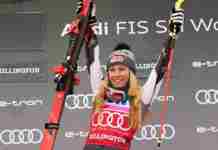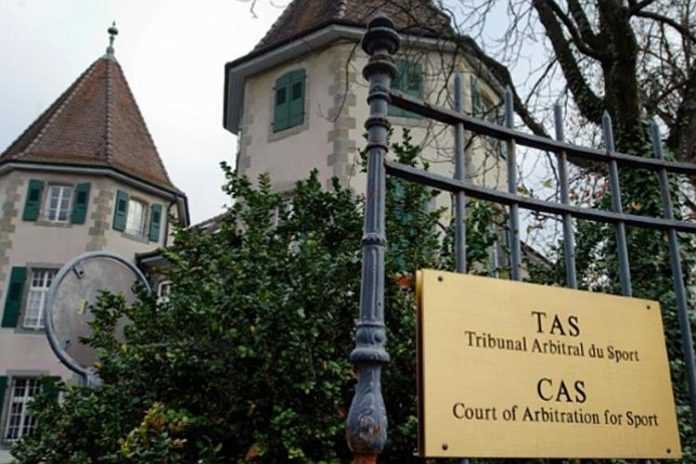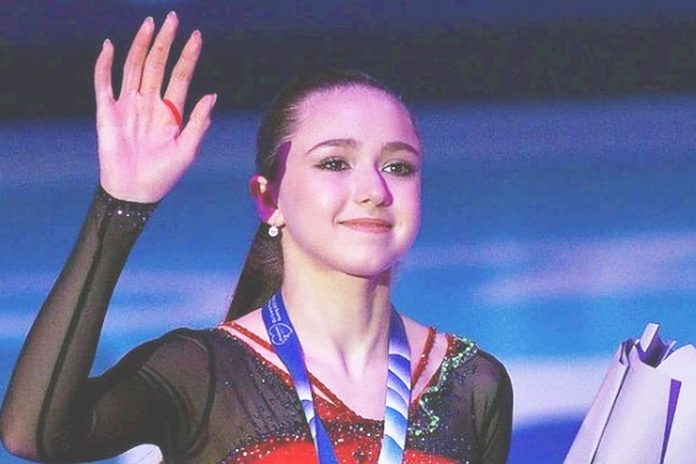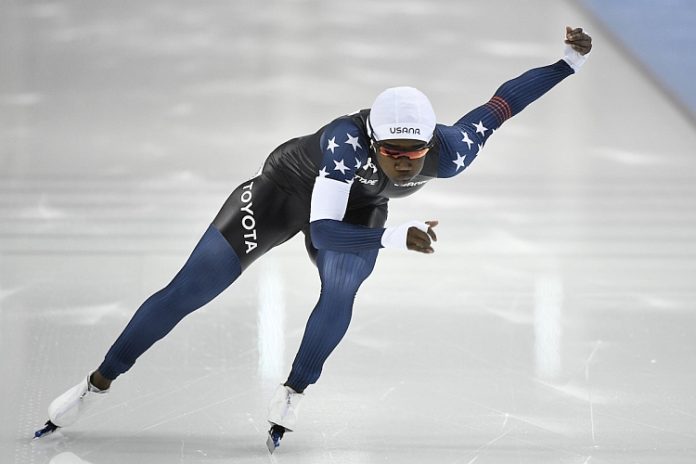(★ Friends: In just a week, 22 donors have covered 40% of our site costs for services for the first six months of 2022. THANK YOU! If you would like to add your support, please donate here. ★)
= BEIJING 2022 =
From Lane One
All Kamila, all the time.
The Court of Arbitration for Sport announced that the appeals by the International Olympic Committee and World Anti-Doping Agency against the decision by the Russian Anti-Doping Agency to end the suspension of 15-year-old women’s skating star Kamila Valieva will take place on Sunday evening.
A decision is expected Monday afternoon, one day before the women’s Short Program will be held.
Valieva tested positive for the banned substance trimetazidine on 25 December 2021 after the Russian national championships, but the notice of a positive test was not made until 8 February, a day after the Russian team – with Valieva – won the Team Event in Beijing.
The arbitrators will be Fabio Iudica (ITA), American Jeffrey Benz and Dr. Vesna Bergant Rakocevic of Slovenia.
RUSADA claimed on Friday that the long delay in the reporting of the test results from an accredited laboratory in Stockholm (SWE) was due to the illness or isolation of lab staff.
The Russian agency stated Friday that “Since the athlete as is a minor, RUSADA launched a probe in regard to the staff of the figure skater. The prime aim of this investigation is to reveal all details of possible violations of anti-doping rules in the interests of ‘a person in defense.’”
Valieva is a member of the Sambo 70 skating club, whose members include the two other women’s entries in Beijing, 2021 World Champion Anna Shcherbakova (age 17) or 2018 and 2019 World Junior Champion Alexandra Trusova (also 17).
¶
Beyond the Valieva case, the Beijing Games are proceeding apace and have passed the halfway mark. Said IOC spokesman Mark Adams (GBR) at Friday’s news conference:
“We have a difficult situation with Covid and I understand that, and quite rightly, people have had a lot of trouble. But we also have had a lot of compliments from people understanding that given the situation that we are in – that we are in a global pandemic – that somehow we have managed to get together – we still have a week to go – but to get together the best winter athletes of the world in Beijing to compete and I think we’ve kind of, almost, discounted that, that we’ve kind of almost forgotten what we’re doing here.
“It is quite an amazing thing that we have managed with our Chinese partners, to get all these people not only to be here, but to qualify, to get here and to compete.
“Are there issues? Yes, I’m sure there are, but I think if you’d asked me a month ago if I thought I would be here … I probably thought I would be here, but if I thought I’d be in this situation, talking about very successful Games so far, I don’t think I would have been able to say that.
“I think it has been a really pretty spectacular effort by everyone concerned , which is appreciated by the athletes and the other stakeholders of course, as well.”
¶
The Olympic Villages at any Olympic Games are a pretty complicated program, and Qianfan Shen, the Director General of the Village Planning & Operations department, told reporters that a total of 678 dishes are being prepared, with the menus developed over two years. The food service program was designed on an eight-day rotation and has special service available for delegations or individuals with dietary restrictions, such as Halal or Kosher meals.
As for size, the main dining hall in the Beijing Village is 2,200 square meters or about 23,680 square feet!
As the Games coincide with the Chinese New Year, some traditional local cuisine is also made available, with dumplings and duck especially popular.
¶
A poignant moment at the end of Friday’s men’s Skeleton competition, when Ukraine’s Vladyslav Heraskevych got off his sled and unfolded a sign before the world-feed television camera reading, in English, “NO WAR IN UKRAINE.”
He finished 18th in the event. NBC’s Mike Tirico – reporting from SoFi Stadium in Inglewood in advance of the Super Bowl – featured the incident in the primetime broadcast, right after the conclusion of the Skeleton event coverage.
Observed: The incident is a clear violation of Olympic Charter Rule 50.2, which states that “No kind of demonstration or political, religious or racial propaganda is permitted in any Olympic sites, venues or other areas.”
Such expressions are specifically banned on the field of play, and the IOC would be in the awkward position of condemning a wish for peace in the face of a ready-to-go Russian invasion of the former Soviet Republic of the Ukraine. But they aren’t going there.
The InsideTheGames Web site asked about the sign and was told, “We have spoken with the athlete. This was a general call for peace. For the IOC the matter is closed.”
¶
The Olympic Covid incidence report for 11 February showed just eight total cases: none at the airport across 81 entries and four each from athletes and team officials and other stakeholders across 71.184 tests inside the closed loop.
The totals now show 180 total positives (arrivals and inside the closed loop) among athletes and team officials and 318 among all other stakeholders since the closed loop began operations on 4 January.
The U.S. Olympic & Paralympic Committee reported Friday that there were no new cases among the 571 delegates in Beijing. The number currently isolated is down to one athlete.
¶
IOC spokesman Adams noted a report from China Central Television that through the 10th, more than 515 million Chinese – about 37% of the country – have seen some part of the Games so far.
NBC reported a stronger Thursday primetime audience of 13.2 million, up from 12.0 million on Wednesday. The program included Shaun White in the Snowboard Halfpipe and Mikaela Shiffrin in the women’s Super-G.
More impressive is NBC’s report that through Thursday, a total of 102.1 million have watched some part of the Games so far, across 58 million U.S. households; that’s about 47% of the total estimate of 122.4 households with television in the country.
For the first even days of the Games (not counting the pre-Games telecast), and subject to final confirmation once all of the numbers come in, the average primetime total audience is now 12.5 million. That is down 36.8% from the nightly average of 19.8 million for the PyeongChang Games in 2018 and down from the 15.1 million nightly primetime average for the Tokyo Games last summer.
¶
Norway continued as the top medal winner in Beijing with 17 total (8-3-6), tied with Germany (8-5-1) for the most golds.
The Germans have 14 total medals, tied with Austria (4-6-4) for second. Russia (3-4-6) and Canada (1-4-8) have 13, trailed by the U.S. (5-5-1), Netherlands (5-4-2) and Italy (2-6-4) with 11.
For a better comparison of team strength, here are our TSX scoring rankings, using the top eight places, via the time-honored U.S. scoring of 10-8-6-5-4-3-2-1. So after 58 of 109 events:
1. 210, Norway
2. 193, Germany
3. 182, Russia
4. 178, Austria
5. 170, United States
6. 155, Canada
7. 131, Italy
8. 130, Netherlands
9. 122, Sweden
10. 117, Japan
11. 96, China
12. 83, Switzerland
~ Rich Perelman
= RESULTS: SAT., 12 FEBRUARY =
● Biathlon: Men’s 10 km Sprint
Norwegian star Johannes Thingnes Boe took off from the start and skied away with a dominating win in the Sprint, finishing in 24:00.4, some 25.5 seconds ahead of co-favorite Quentin Fillon Maillet of France.
Boe, a two-time World Champion in this event, had a 15.9-second lead after just the first loop of the three-circuit race, over Sweden’s 2021 World Champion, Martin Ponsiluoma. But the end of the second loop, Boe was up by 28.2 seconds over Fillon Maillet and he cruised home.
Fillon Maillet was undisturbed in second (24:25.9) for his second medal of the Games, after winning the 20 km Individual race. Russian Maxim Tsvetkov was a couple of seconds back of the Frenchman after two laps, but faded. Tarjei Boe, the older brother of Johannes, came up to grab the bronze in 24:39.3, his second medal after a gold in the Mixed Relay.
The top three had only one shooting penalty each. Tsvetkov – who shot clean – finished fourth in 24:41.0. Jake Brown was the top American, in 22nd.
● Cross Country Skiing: Women’s 4×5 km Relay
Russian Veronika Stepanova skated past Germany’s Sofie Krehl on the final leg to win the women’s 4 x 5 km relay by 53:41.0-53:59.2 in what was essentially a two-team race.
Yulia Stupak led the first (Classical) leg for the Russians, with Katherine Sauerbrey 1.5 seconds behind, but third-place Masako Ishida (JPN) already 12.3 seconds back of the leader in third. Germany’s Katharina Henning took the lead after the second Classical leg, surprisingly passing World Cup leader Natalia Nepryaeva for a 4.3-second edge at the exchange.
Victoria Carl maintained the small German lead over Tatiana Sorina in the first Freestyle leg, but Stepanova ran away from Krehl and won by 18.2 seconds.
Behind them was a tight race for the bronze, with Jonna Sundling completing the fastest leg of the race to come from fifth to third for Sweden in 54:01.7. She passed Finland’s Krista Parmakoski on the final leg, who finished fourth (54:02.2).
Norway’s Therese Johaug had the fastest Classical leg while skiing second, but the team faded to fifth (54:09.8). The U.S. was sixth, another minute back (55:09.2) with Hailey Swirbul, Rosie Brennan, Novie McCabe and Jessie Diggins.
● Skeleton: Women
Germany swept all four event in Luge and continued its dominance at the Yanqing National Sliding Centre by completing a sweep of both the men’s and women’s Skeleton races, earning the country’s first-ever golds in both events.
However, it was not four-time World Champion Tina Hermann who won, but 21-year-old Hannah Niese, the 2021 World Junior Champion, who had the fastest time on each of the last three runs to move from eighth to gold in a combined time of 4:07.62.
The surprises didn’t stop there. Australia’s Jaclyn Narracott, the leader after two runs, stay consistent and ranked 2-3-3-4 on her four runs to end up second (4:08.24) and win Australia’s first-ever Skeleton medal.
So much for the IBSF World Cup season; the gold and silver medalists had a combined total of one medal – a win for Narracott – between them.
The World Cup seasonal winner, Kimberley Bos, started out badly, ranking 10th after the first round. But she finished 2-4-2 in her last three runs to get the bronze, edging Hermann, 4:08.46-4:08.73.
American Katie Uhlaender, 37, finished a very creditable sixth in 4:09.23 in her fifth Olympic Games; she had previously finished 6-11-4-13 in 2006-10-14-18.
On to the bobsled races, where another German sweep is possible.
● Ski Jumping: Men’s Large Hill (140 m)
Norway’s Marius Lindvik, 23, has been a solid scorer on the World Cup circuit, with 18 medals in his seven seasons on tour. But he became a star on Saturday with a clutch second jump to move from silver to gold.
Japan’s Ryoyu Kobayashi, the Normal Hill winner, was going for an Olympic double after leading the first round by 147.0-144.8-144.6 over Lindvik and Slovania’s Timi Zajc. But Lindvik earned the top score in the final round – 151.8 – to overtake Kobayashi and win by 296.1-292.8.
It was Norway’s first win in this event since 1964 and first individual win in men’s jumping since 2006.
World Cup leader Karl Geiger (GER) was standing sixth after the first round, but moved up to third overall with his third-place jump in the second round, totaling 281.3. That was good enough to keep two-time defending champ Kamil Stoch (POL) out of the medals (277.2).
Kobayashi is the first Japanese jumper to win two medals in the same Games since 1998.
● Snowboard: Mixed Team SnowCross
The U.S. had a strong team coming in, with exquisite experience: 40-year-old Nick Baumgartner, a two-time Worlds SnowCross bronze medalist and 36-year-old Lindsey Jacobellis, the Beijing 2022 SnowCross gold medalist.
Competing in heavy snow, the U.S. won its heat, with Baumgartner second and Jacobellis winning, then finished second to Italy 1 in the semi as the other teams fell in the women’s (second) run and Jacobellis just cruised in with a place in the medal final assured.
In the final, Baumgartner eked out a 0.04-second win over Italy 1 veteran Omar Visintin, meaning Jacobellis was going to have to defeat four-time Worlds medal winner Michela Moioli.
The Italian got the jump on Jacobellis at the start, but the American was patient and waited. The two were soon separated from the other finalists – Canada and Italy 2 – and it was one-in-one for the gold. Moioli led into the bottom half of the course, but Jacobellis took charge with an inside pass and got to the final jump first, building a small but decisive lead … and the gold medal by 0.20 seconds (0.24 seconds final margin).
Canada for up for the bronze medal, 23.43 behind the U.S. in total. Australian star Belle Brockhoff was injured in a crash during her quarterfinal and had to be taken to a hospital, but was cleared to return to the Athletes Village.
Jacobellis, who came into Beijing with only her infamous silver in 2006, now has two golds and she and Baumgartner are the first-ever Olympic Mixed Team champions.
● Speed Skating: Men’s 500 m
China’s Tingyu Gao, the 2018 Olympic bronze medalist, won the first World Cup race of the season last November, but earned only one more medal (a bronze) during the rest of the season.
But more importantly, he was ready for the most important race of the season.
Skating in the seventh pair out of 14, Gao ripped off an Olympic Record time of 34.32 and then watched as it stood up for the gold medal, China’s first-ever Olympic speed skating victory!
The closest call came in the 10th pairing, with Korea’s Min-kyo Cha – the 2018 silver medalist in this event – won in 34.39, just 0.07 back.
Japan’s Wataru Morishige also got close, in the 14th pairing, winning in 34.49: that stood up for bronze.
Favored Laurence Debreuil of Canada was in the 15th and final pair and while he won easily over Japan’s Tatsuya Shinhama, his time of 34.522 only ranked fourth.
U.S. youngster Jordan Stolz, 17, was 13th in 34.85.
Elsewhere:
● Bobsled: The new Women’s Monobob event gets underway, with Americans Elana Meyers Taylor (four wins) and Kaillie Humphries (two wins) finishing first and second in the IBSF World Cup seasonal standings. Their biggest challengers figure to be Canadians Cynthia Appiah and Christine de Bruin, Australia’s Breeana Walker and German Laura Nolte.
● Curling: The U.S. men’s team, skipped by John Shuster, fell to 2-2 after a 7-6 loss to Norway in round-robin play. Sweden (Niklas Edin) continues to lead at 4-0, with five teams all at 2-2.
Tabitha Peterson’s U.S. women’s squad lost to Great Britain, 10-5, and is now 3-1 in the 10-team tournament.
● Ice Hockey: The U.S. men’s team posted an impressive 4-2 win over Canada in group play, taking a 2-1 lead after one period and winning the third period, 1-0.
The game started hot, with a Mat Robinson goal for Canada just 1:24 in, with Andy Miele scoring for the U.S. just 1:10 later to tie the score. Ben Meyers scored for the U.S. at 18:44 of the period for a 2-1 lead, with the U.S. out-shooting Canada, 13-12.
Both teams scored in the second period, with Brendan Brisson scoring a third American goal just 2:37 into the period and taking control of the game. But despite a penalty, Canada scored a short-handed goal at 14:13 of the period by Corban Knight to close to 3-2.
Canada went all-out to tie the game in the third and out-shot the U.S. by 17-5. But the only goal came at 6:13 from American Kenny Agostino, with an assist by Miele to finish up the scoring.
The U.S. goes to 2-0 in Group A and has one more game to play, on Sunday vs. Germany (1-1).
¶
The U.S. women will meet Finland on Monday in the semifinals, after a 7-1 victory by the Finns over Japan. The American women defeated Finland, 5-2, in their first game.
Canada will meet Switzerland, which defeated Russia, 4-2. The Canadian women beat up the Swiss, 12-1, in their group-stage match-up.
= PREVIEWS: SUN., 13 FEBRUARY =
(7 events across 5 disciplines)
● Alpine Skiing: Men’s Giant Slalom
Austria’s Marco Odermatt is the favorite, having won four of the five World Cup races held this season, and second in the other. He finished seventh in the Downhill, but did not finish in the Super-G in Beijing.
His teammate Manuel Feller won three World Cup medals (0-1-2) this season and fellow Austrian Marco Schwarz won the 2021 World Championships bronze medal.
But no one is overlooking France’s Alexis Pinturault. The bronze medalist in this event in 2014 and 2018, he has won two Worlds bronze medals in this event and was 11th in the Beijing Super-G, but did not finish in the Combined. Teammate Mathieu Favre is the 2021 World Champion in this event.
Any discussion of potential medalists must include Norway’s Henrik Kristoffersen, the 2018 silver medalist and 2019 World Champion; he was also a winner on the World Cup tour this season. Same for Italian Luca De Aliprandini, the 2021 Worlds silver winner and a World Cup silver medalist this season.
Slovenia’s Zan Kranjec has seven career World Cup medals and two wins; his best this season has been a bronze medal.
● Biathlon: Men’s 12.5 km Pursuit ~ Women’s 10 km Pursuit
Five World Cup pursuit races were held, with French star Quentin Fillon Maillet – already the 20 km Individual race champion – the winner in the last four. That makes him the favorite.
However, he is not the reigning World Champion. That would be teammate Emilien Jacquelin, who won a silver with the French team in the Mixed Relay. He’s won a silver and a bronze on the World Cup tour this season.
There are several other contenders, starting with the Norwegians: Vetle Christiansen, the only one other than Fillon Maillet to win a World Cup Pursuit this season, and the brothers Tarjei Boe and Johannes Thingnes Boe, the Worlds silver medalist in 2017-19-20 and bronze winner in 2021.
Sweden’s Sebastian Samuelsson won three World Cup medals, including two silvers and was the 2018 silver medalist in PyeongChang and 2021 Worlds silver medalist. He has to be a medal favorite for sure.
Russians Eduard Latypov and Alexsandr Loginov both won World Cup medals; Loginov won a Worlds bronze in the 2020 Worlds Pursuit race. Wild card: Anton Smolski, who won the silver in the 20 km Individual race in Beijing and also a World Cup bronze in mid-January.
If Fillon Maillet should win, it was be the third straight gold for France, with Martin Fourcade winning the last two.
¶
Just as with the men, there were five 10 km women’s Pursuit races held so far in the World Cup season and Norway’s Marte Olsbu Roeiseland won four of them, and was third in the other.
Already the Sprint winner and bronze medalist in the 15 km Individual race, Roeiseland must be favored to add a second gold. She won a 2020 Worlds bronze in this event.
Her principal challengers are the Swedish Oeberg sisters. Elvira – the Sprint silver medalist in Beijing – won the only World Cup that Roeiseland didn’t and was second and third in two others. Hanna won two World Cup Pursuit bronzes, and was the 15 km Individual gold medalist back in 2018.
France is also going to have a say in the women’s race, with Anais Bescond, Anais Chevalier-Bouchet and Julia Simon, all World Cup medal winners this season. Bescond won the 2018 bronze in this event and Chevalier-Bouchet won the 15 km Individual silver.
Hanna Sola and Dzinara Alimbekava from Belarus both won World Cup medals; Alimbekava was fifth in the 15 km Individual in Beijing.
● Cross Country Skiing: Men’s 4×10 km Relay
Only one World Cup relay was held this season, a 4 x 7.5 km combo with Norway winning over Russia and a second Norwegian team taking third. There will only be one Norwegian squad this time and will be a big favorite once again, defending their 2018 PyeongChang title.
Russia has won two Olympic silvers in a row in this event and has Beijing medalists Alexander Bolshunov and Denis Spitsov at the ready; both were on the 2018 silver winners.
France has won two straight Olympic bronzes in this event and won the 2020 and 2021 Worlds bronze as well. Why not three?
● Short Track: Men’s 500 m ~ Women’s 3,000 m Relay
The sprinters are out for the last individual event in the men’s program, with a good possibility for a home-country gold for Dajing Wu, the defending champion from 2018 and the silver medalist in 2014. He won the last World Cup race of the 2021 season and is a slight favorite.
His teammate Ziwei Ren, the winner of the 1,000 m in Beijing, won a World Cup silver and bronze this season at 500 m, and is also a medal favorite.
Korea’s Dae-heon Hwang won the 1,500 m gold in Beijing, but he was also the PyeongChang 500 m silver medalist and the World Champion in this event in 2018 and 2019. He’s in the mix.
Then there are Hungarian brothers Shaoang Liu and Shaolin Sandor Liu. The latter was the 2016 World Champion at 500 m and won the pre-Olympic World Cup 500 m last October over former American John-Henry Krueger, the 2018 Olympic 1,000 m silver medalist, and then a second World Cup in November. Shaoang, the younger brother, already owns a Beijing bronze in the 1,000 m and has a World Cup 500 m medal this season as well.
Lesser known, but very dangerous are Canadian Steven Dubois, the 1,500 m runner-up and Kazakhstan’s Denis Nikisha, a two-time World Cup medalist this season. Russia’s Semion Elistratov won the 1,500 m bronze in Beijing, but has also won a Worlds bronze in the 500 m
¶
This is the ninth edition of the women’s relay in the Olympic Games and South Korea has won seven times, including the last two. The Netherlands won this race in three of four World Cups this past season and was second in the other, beating South Korea twice and Canada twice.
China won the pre-Olympic World Cup relay ahead of the Dutch and the Koreans, and Italy won two bronzes.
In the end, the race might come down to the 500 m and 1,000 m winners – Arianna Fontana of Italy and Suzanne Schulting – leading their teams on the final laps. That would be too close to call.
● Speed Skating: Women’s 500 m
The shortest race on the Beijing program will feature one of the touching stories of the 2022 Games.
American Erin Jackson came into her own this season, winning the first three World Cup races and four of the first six. But she finished only third in the U.S. Trials at 500 m, putting her at risk of not being selected as an added competitor under the ISU rules until teammate Brittany Bowe gave up her place in the 500 m to be sure that Jackson made it to Beijing.
Now Jackson is on the big stage once again. She finished 24th as a teen in PyeongChang and has no World Championships medals. But she has great ability and this is her chance.
Defending Olympic gold medalist Nao Kodaira (JPN) has literally been the “gold standard” in this event, winning world titles in 2017 and 2020. Russia has two strong contenders: 2021 World Champion Angelina Golikova and bronze winner Olga Fatkulina, both of whom beat Jackson at least twice during the World Cup season.
What about the Dutch? Femke Kok is the 2020 Worlds silver medalist and not to be ignored. A wild card: Poland’s Andzelika Wojcik, a World Cup winner in the Salt Lake City World Cup in December, but quiet during the rest of the season.
= BEYOND BEIJING =
● Athletics ● A run at the American indoor record for the men’s mile came pretty close last night at the Wisconsin Windy City Invitational in Chicago, where Americans Cooper Teare and Cole Hocker went after the 3:49.89 mark by Bernard Lagat in 2005.
The pair, running as Oregon teammates in February 2021, clocked 3:50.39 (Teare) and 3:50.55 (Hocker) in Fayetteville, Arkansas. On Friday, they were paced through 1:57 for the half and 2:55 for three quarters before Teare managed a 55.0 last quarter to 55.3 for Hocker to win again, 3:50.17 to 3:50.35. Michigan State’s Morgan Beadlescomb (USA) was third in 3:52.03, a school record, his time under 4:00 and now the no. 4 performer in U.S. collegiate history.
Teare and Hocker authored the nos. 3 and 4 performances in U.S. history, the world leads for 2022 and maintain Teare and Hocker as the nos. 7-8 performers on the all-time indoor mile list. Pretty good for mid-February!
¶
Poland’s Ewa Swoboda won the women’s 60 m at the Orlen Cup in Lodz (POL) on Friday in a world-leading 7.00, breaking her own national record of 7.04 from the heats. It moves her to no. 10 on the all-time list, in her seasonal debut.
Italy’s Olympic men’s 100 m champ Lamont Marcell Jacobs won the men’s 60 m in 6.49, ahead of American Michael Rodgers, 6.62.
At the David Hemery Invitational in Boston, Canada’s Gabriela DeBues-Stafford won the women’s 5,000 in a world-leading 14:31.38, a national record. That was just good enough to beat American Elise Cranny, second in 14:33.17, shattering the American Record of 14:47.62 by Shalane Flanagan from 2009. DeBues-Stafford moves to no. 6 on the all-time indoor list, with Cranny now at no. 7.
Jamaica’s Danielle Williams lowered the world lead in the women’s 60 m hurdles to 7.75 at the Tiger Paw Invitational at Clemson, South Carolina, and NCAA 400 m champ Randolph Ross won the men’s 400 m in 44.83, lowering his own world lead in the event from 45.37.
● Basketball ● The U.S. women scored a 84-75 win over Belgium in their first game at the FIBA World Cup Qualifying Tournament being held in Washington. D.C.
After a 15-15 first quarter, the Americans ran up a 23-11 second quarter edge for a 38-26 halftime score and the issue was essentially decided. The lead was extended to 63-44 at the end of the third and even with a Belgian rally in the fourth, the U.S. prevailed.
The U.S. was led by veteran guard Kelsey Plum with 16, followed by forward Brionna Jones (14) and guard Chelsea Gray (10); the team shot 51.6% from the field.
Next up is Puerto Rico on Saturday; the other games in the group are being played in Santo Domingo (DOM), but Russia will not travel to the U.S. due to Covid protocol complications. The FIBA Executive Committee decided the game will not be played and both teams will be given a point in the standings. The top three teams advance to the FINA World Cup; the U.S. (the defending champs) is already qualified.
● Swimming ● American Freestyle superstar Katie Ledecky must be pretty happy that (a) FINA found a new spot for the 2022 World Championships and (b) with her new training situation at the University of Florida.
At the Southern Zone South Sectional Championships in Orlando, Ledecky produced sensational marks: of 8:11.83 to win the women’s 800 m Free and 1:54.66 in the 200 m Free, before winning the 400 m Medley in a good-for-her 4:39.68.
The 800 m Free (8:11.83) on Thursday (10th) was faster than her Tokyo winning time of 8:12.57 and her fastest since 2019. It’s the no. 14 performance all-time.
The 1:54.66 in the 200 m Free on Friday is also faster than her Tokyo mark of 1:55.21, ranks equal-31st all-time and is her fastest since April 2021.
Her win in the Medley is her first swim in the event since 2019. All this in February.
¶
American Olympic swim star Tracy Caulkins, winner of the 200-400 m Medleys and in the 4×100 m Medley at the 1984 Olympic Games in Los Angeles, was named the President of Swimming Australia on Friday.
Caulkins married Australia swimmer Mark Stockwell in 1991 and has been there ever since. Now 59, she takes over one of the world’s premier swimming federations, but one which has been dogged by allegations of abuse against female swimmers over the past two years.
You can receive our exclusive TSX Report by e-mail by clicking here. You can also refer a friend by clicking here, and can donate here to keep this site going.
For our 832-event International Sports Calendar for 2022 and beyond, by date and by sport, click here!























